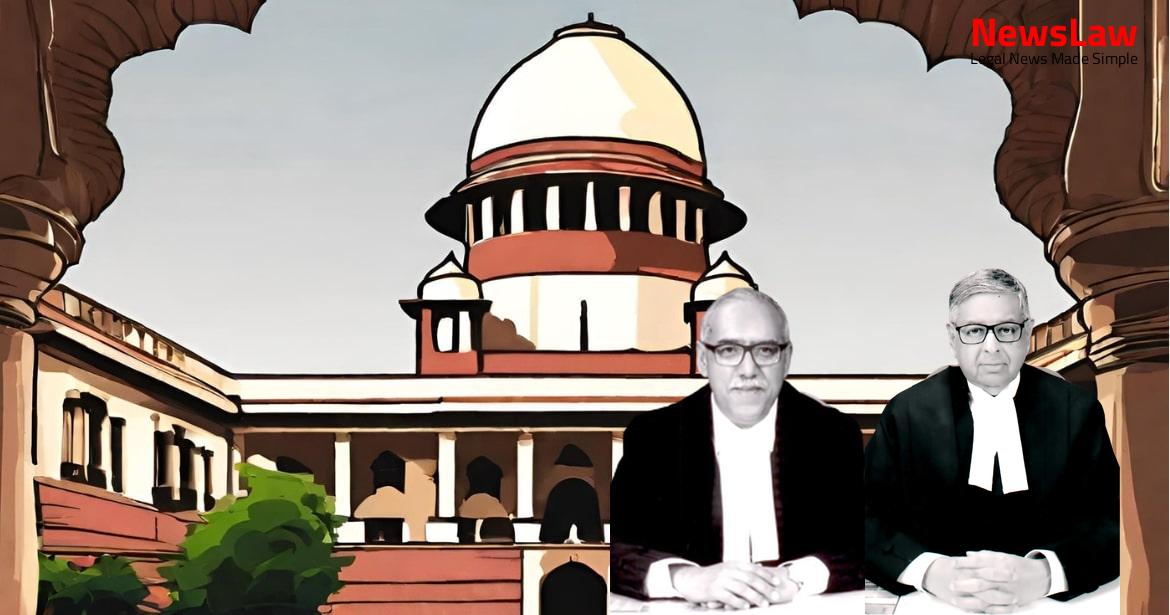A significant legal case has been resolved by the Supreme Court of India regarding the application of the Portuguese Civil Code in inheritance disputes. The case involved interpreting laws related to the property of the late Joaquim Mariano Pereira and the rights of his heirs. The judgment sheds light on the intricate legal complexities between different laws governing properties inside and outside Goa. Learn more about this landmark decision that will have far-reaching implications on succession laws in the country.
Facts
- Joaquim Mariano Pereira (JMP) had three daughters and a wife.
- On 06.05.1957, JMP bequeathed a property in Bombay to his youngest daughter Maria Luiza Valentina Pereira.
- JMP died on 02.08.1967.
- After JMP’s death, there were disputes regarding the inclusion of the Bombay property in inventory proceedings.
- The appellant, a legal representative of Virginia Pareira, filed objections and sought clarity on the succession laws applicable to the property.
- The High Court of Bombay, Goa Bench, made orders regarding the inclusion and exclusion of the Bombay property in the inventory.
- There was a debate on whether the property in Bombay should be governed by the Portuguese Civil Code or the Indian Succession Act, 1925.
- Certain provisions of the Civil Code relating to succession were referred to during the proceedings.
- Ultimately, the decision regarding the applicability of the Civil Code or the Indian Succession Act for the Bombay property was crucial in this case.
- The administration and probate processes were intertwined with the interpretation of relevant laws and regulations.
- The High Court’s judgment stated that the Indian Succession Act, 1925’s provisions, particularly Section 5, take precedence over the Civil Code.
- The application of the Civil Code was rejected for properties outside of Goa and in other parts of India.
- Specifically, the judgment highlighted that the Indian Succession Act, 1925 would govern inheritance and succession matters regarding properties located outside Goa.
- The High Court’s decision emphasized the distinction in application of laws based on the location of the property.
Also Read: Enforcement of Foreign Award: Case of Oscar Investments Limited and RHC Holding Private Limited
Arguments
- Shri Devadatt Kamat, representing the appellant, argues that Portuguese law applies to domiciles of Goa, even when sitting as Judges of the Supreme Court of India.
- He suggests that the principles of private international law would apply, invoking the renvoi doctrine to emphasize applying foreign law to citizens of Goa.
- Under Portuguese law, there is a unity of succession principle for the property of a deceased Portuguese citizen, whether within or outside the country, for inventory proceedings.
- Article 24 of the Code, according to him, is not applicable, and Articles 1737, 1784, and 1961 are more relevant.
- He challenges the judgment of the learned Single Judge, supporting the Division Bench’s conclusion that the Civil Code applies to properties outside Goa as well.
- He clarifies that a grant of probate of the Will does not confirm its validity.
- Article 24 of the Civil Code pertains only to properties ‘situated in the kingdom’.
- He asserts that the property in Bombay would be subject to the Indian Succession Act, specifically under Section 5.
- The Civil Code would only apply to properties within the State of Goa and not beyond.
- The probate of the Will, in which the petitioner participated, is a final adjudication determining the rights of the parties.
- The common law principle of lex rei situs should apply in the case of immovable properties.
- The law in force at the place where immovable property is situated should apply.
Also Read: NGOs Substantial Financing Case: Supreme Court’s Judgment on Public Authority Definition
Analysis
- Goa, Daman, and Diu were annexed by the Government of India in 1961, becoming part of India by constitutional virtue.
- The applicability of the Portuguese Civil Code in Goa is due to an Ordinance and Act passed by the Indian Parliament post-annexation.
- The application of the Civil Code in matters of succession extends to all properties held by Goan domiciles, both within and outside Goa.
- The special law of the Civil Code prevails over general Indian inheritance laws in Goa.
- The inheritance provisions under the Civil Code ensure a reserved legitime for heirs, restricting the disposal of property by will to only a certain portion.
- The Goan succession laws align with the principles of unity in succession and ensure certainty of succession.
- The grant of probate of a will does not affect the inheritance rights prescribed by the Civil Code.
- The concept of legitime in the Civil Code applies to not just ancestral but also self-acquired properties in Goa.
- The Portuguese Civil Code became applicable to Goan domiciles post-annexation, making it an Indian law for all practical purposes.
- The territorial acquisition of Goa altered its legal landscape, making it imperative for all properties of Goan domiciles to be governed by the Civil Code.
- Article 1737 of the Code stipulates that an inheritance comprises all assets, rights, and liabilities of the deceased.
- The property of a Goan domicile outside Goa may be governed by the Code, Indian Succession Act, or personal laws applicable in the rest of India.
- The effect of probate granted by the Bombay High Court for JMP’s Will is significant.
- The Portuguese Civil Code considers the estate as two parts: disposable by testamentary disposition and indisposable.
- Article 1766 prohibits a married person from disposing of certain properties without consent, under penalty of nullity.
- Goa follows a system of universal succession where all properties of the person in question are considered as one conglomerate unit for succession rules to apply.
- The conflict between different laws on inheritance like the Indian Succession Act and the Portuguese Civil Code exists in Goa.
- The Portuguese Civil Code is considered as a special and local law for matters of succession in Goa, applicable only to Goan domiciles and their properties within and outside Goa.
- The application of different laws for properties inside and outside Goa can lead to disputes and uncertainty in succession.
- The rights under old laws may not survive when new territory is acquired through conquest, unless the new sovereign chooses to recognize those rights.
- The grant of probate by a high court does not affect the inheritance rights of all legal heirs.
- The non-existence of a Uniform Civil Code applicable to all citizens of India, despite previous exhortations by the courts, is noted.
- Goa has successfully implemented a uniform civil code regardless of religion, with exceptions to protect certain rights.
- The Portuguese Civil Code, which was once of foreign origin, became an Indian law when enforced in Goa through an Act of the Indian Parliament.
- The laws of Goa, Daman, and Diu prior to their conquest by India, including the Portuguese laws, continue to apply until amended or repealed by competent authorities.
- Portuguese Civil Code, 1867 applies in State of Goa for succession and inheritance rights.
- The property of late JMP at Bombay must be included in the inventory proceedings in Goa.
Also Read: Maintenance Rights of Divorced Women: Reconsideration Plea by Mr. Debal Banerjee
Decision
- Allowance of the appeal
- Setting aside the judgment of the Single Judge dated 08.08.2002
- Restoring the order of the Court of Comarca Judge of Salcete and Quepem
- Reinstatement of Inventory Proceedings No.20436 dated 15.10.1999
- Disposition of any pending applications
Case Title: JOSE PAULO COUTINHO Vs. MARIA LUIZA VALENTINA PEREIRA .
Case Number: C.A. No.-007378-007378 / 2010



